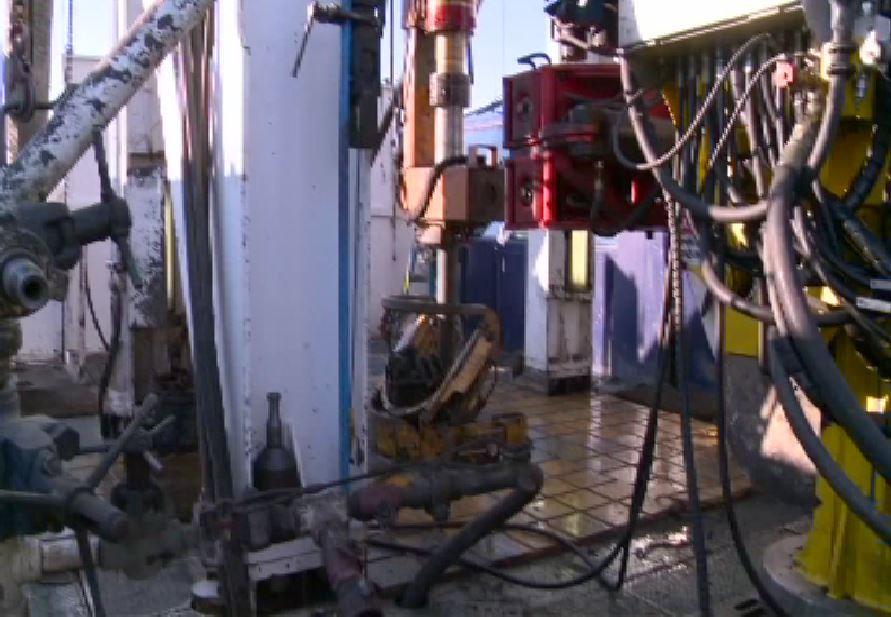As the U.S. waiver deadline for certain countries regarding Iran oil sanctions has ended, Turkey said it is unable to diversify its oil imports in such a short period of time, with a possible rise in tensions with the U.S. on the horizon if a solution can’t be found.
Last year U.S. President Donald Trump withdrew from the 2015 nuclear deal signed with Iran and other world powers and moved to reinstate sanctions against Iran, giving eight countries a six-month window to end their Iranian oil imports.
Countries such as India and Japan signaled they would bow to U.S. pressure, but others such as Turkey remained defiant.
Turkey has been carrying out intense political negotiations with U.S. officials as Ankara tries to convince Washington to allow its oil refiner Tupras to continue importing from Tehran.
As the U.S. deadline passed, Turkish Foreign Minister Mevlut Cavusoglu made a statement regarding Ankara’s current position, and stressed if Turkey was forced to renew its technology in order to diversify its sources to comply with U.S. sanctions, refineries would need to be shut down for some time, a measure which would be costly for Turkey.
A board member of Corporate Finance Services Ltd., emphasized that Iran plays a crucial role in serving Turkey’s energy needs.
Turkey is already in conflict with Washington over its refusal to back down from the S-400 missile defense systems deal it signed with Russia. If Turkey decides to disregard U.S. sanctions and continues to import oil from Iran, more troubling times could lie ahead for both Ankara-Washington ties and for the Turkish economy.
As the U.S. waiver deadline for certain countries regarding Iran oil sanctions has ended, Turkey said it is unable to diversify its oil imports in such a short period of time, with a possible rise in tensions with the U.S. on the horizon if a solution can’t be found.
Last year U.S. President Donald Trump withdrew from the 2015 nuclear deal signed with Iran and other world powers and moved to reinstate sanctions against Iran, giving eight countries a six-month window to end their Iranian oil imports.
Countries such as India and Japan signaled they would bow to U.S. pressure, but others such as Turkey remained defiant.
Turkey has been carrying out intense political negotiations with U.S. officials as Ankara tries to convince Washington to allow its oil refiner Tupras to continue importing from Tehran.
As the U.S. deadline passed, Turkish Foreign Minister Mevlut Cavusoglu made a statement regarding Ankara’s current position, and stressed if Turkey was forced to renew its technology in order to diversify its sources to comply with U.S. sanctions, refineries would need to be shut down for some time, a measure which would be costly for Turkey.
A board member of Corporate Finance Services Ltd., emphasized that Iran plays a crucial role in serving Turkey’s energy needs.
Turkey is already in conflict with Washington over its refusal to back down from the S-400 missile defense systems deal it signed with Russia. If Turkey decides to disregard U.S. sanctions and continues to import oil from Iran, more troubling times could lie ahead for both Ankara-Washington ties and for the Turkish economy.
As the U.S. waiver deadline for certain countries regarding Iran oil sanctions has ended, Turkey said it is unable to diversify its oil imports in such a short period of time, with a possible rise in tensions with the U.S. on the horizon if a solution can’t be found.
Last year U.S. President Donald Trump withdrew from the 2015 nuclear deal signed with Iran and other world powers and moved to reinstate sanctions against Iran, giving eight countries a six-month window to end their Iranian oil imports.
Countries such as India and Japan signaled they would bow to U.S. pressure, but others such as Turkey remained defiant.
Turkey has been carrying out intense political negotiations with U.S. officials as Ankara tries to convince Washington to allow its oil refiner Tupras to continue importing from Tehran.
As the U.S. deadline passed, Turkish Foreign Minister Mevlut Cavusoglu made a statement regarding Ankara’s current position, and stressed if Turkey was forced to renew its technology in order to diversify its sources to comply with U.S. sanctions, refineries would need to be shut down for some time, a measure which would be costly for Turkey.
A board member of Corporate Finance Services Ltd., emphasized that Iran plays a crucial role in serving Turkey’s energy needs.
Turkey is already in conflict with Washington over its refusal to back down from the S-400 missile defense systems deal it signed with Russia. If Turkey decides to disregard U.S. sanctions and continues to import oil from Iran, more troubling times could lie ahead for both Ankara-Washington ties and for the Turkish economy.
As the U.S. waiver deadline for certain countries regarding Iran oil sanctions has ended, Turkey said it is unable to diversify its oil imports in such a short period of time, with a possible rise in tensions with the U.S. on the horizon if a solution can’t be found.
Last year U.S. President Donald Trump withdrew from the 2015 nuclear deal signed with Iran and other world powers and moved to reinstate sanctions against Iran, giving eight countries a six-month window to end their Iranian oil imports.
Countries such as India and Japan signaled they would bow to U.S. pressure, but others such as Turkey remained defiant.
Turkey has been carrying out intense political negotiations with U.S. officials as Ankara tries to convince Washington to allow its oil refiner Tupras to continue importing from Tehran.
As the U.S. deadline passed, Turkish Foreign Minister Mevlut Cavusoglu made a statement regarding Ankara’s current position, and stressed if Turkey was forced to renew its technology in order to diversify its sources to comply with U.S. sanctions, refineries would need to be shut down for some time, a measure which would be costly for Turkey.
A board member of Corporate Finance Services Ltd., emphasized that Iran plays a crucial role in serving Turkey’s energy needs.
Turkey is already in conflict with Washington over its refusal to back down from the S-400 missile defense systems deal it signed with Russia. If Turkey decides to disregard U.S. sanctions and continues to import oil from Iran, more troubling times could lie ahead for both Ankara-Washington ties and for the Turkish economy.
As the U.S. waiver deadline for certain countries regarding Iran oil sanctions has ended, Turkey said it is unable to diversify its oil imports in such a short period of time, with a possible rise in tensions with the U.S. on the horizon if a solution can’t be found.
Last year U.S. President Donald Trump withdrew from the 2015 nuclear deal signed with Iran and other world powers and moved to reinstate sanctions against Iran, giving eight countries a six-month window to end their Iranian oil imports.
Countries such as India and Japan signaled they would bow to U.S. pressure, but others such as Turkey remained defiant.
Turkey has been carrying out intense political negotiations with U.S. officials as Ankara tries to convince Washington to allow its oil refiner Tupras to continue importing from Tehran.
As the U.S. deadline passed, Turkish Foreign Minister Mevlut Cavusoglu made a statement regarding Ankara’s current position, and stressed if Turkey was forced to renew its technology in order to diversify its sources to comply with U.S. sanctions, refineries would need to be shut down for some time, a measure which would be costly for Turkey.
A board member of Corporate Finance Services Ltd., emphasized that Iran plays a crucial role in serving Turkey’s energy needs.
Turkey is already in conflict with Washington over its refusal to back down from the S-400 missile defense systems deal it signed with Russia. If Turkey decides to disregard U.S. sanctions and continues to import oil from Iran, more troubling times could lie ahead for both Ankara-Washington ties and for the Turkish economy.
As the U.S. waiver deadline for certain countries regarding Iran oil sanctions has ended, Turkey said it is unable to diversify its oil imports in such a short period of time, with a possible rise in tensions with the U.S. on the horizon if a solution can’t be found.
Last year U.S. President Donald Trump withdrew from the 2015 nuclear deal signed with Iran and other world powers and moved to reinstate sanctions against Iran, giving eight countries a six-month window to end their Iranian oil imports.
Countries such as India and Japan signaled they would bow to U.S. pressure, but others such as Turkey remained defiant.
Turkey has been carrying out intense political negotiations with U.S. officials as Ankara tries to convince Washington to allow its oil refiner Tupras to continue importing from Tehran.
As the U.S. deadline passed, Turkish Foreign Minister Mevlut Cavusoglu made a statement regarding Ankara’s current position, and stressed if Turkey was forced to renew its technology in order to diversify its sources to comply with U.S. sanctions, refineries would need to be shut down for some time, a measure which would be costly for Turkey.
A board member of Corporate Finance Services Ltd., emphasized that Iran plays a crucial role in serving Turkey’s energy needs.
Turkey is already in conflict with Washington over its refusal to back down from the S-400 missile defense systems deal it signed with Russia. If Turkey decides to disregard U.S. sanctions and continues to import oil from Iran, more troubling times could lie ahead for both Ankara-Washington ties and for the Turkish economy.
As the U.S. waiver deadline for certain countries regarding Iran oil sanctions has ended, Turkey said it is unable to diversify its oil imports in such a short period of time, with a possible rise in tensions with the U.S. on the horizon if a solution can’t be found.
Last year U.S. President Donald Trump withdrew from the 2015 nuclear deal signed with Iran and other world powers and moved to reinstate sanctions against Iran, giving eight countries a six-month window to end their Iranian oil imports.
Countries such as India and Japan signaled they would bow to U.S. pressure, but others such as Turkey remained defiant.
Turkey has been carrying out intense political negotiations with U.S. officials as Ankara tries to convince Washington to allow its oil refiner Tupras to continue importing from Tehran.
As the U.S. deadline passed, Turkish Foreign Minister Mevlut Cavusoglu made a statement regarding Ankara’s current position, and stressed if Turkey was forced to renew its technology in order to diversify its sources to comply with U.S. sanctions, refineries would need to be shut down for some time, a measure which would be costly for Turkey.
A board member of Corporate Finance Services Ltd., emphasized that Iran plays a crucial role in serving Turkey’s energy needs.
Turkey is already in conflict with Washington over its refusal to back down from the S-400 missile defense systems deal it signed with Russia. If Turkey decides to disregard U.S. sanctions and continues to import oil from Iran, more troubling times could lie ahead for both Ankara-Washington ties and for the Turkish economy.
As the U.S. waiver deadline for certain countries regarding Iran oil sanctions has ended, Turkey said it is unable to diversify its oil imports in such a short period of time, with a possible rise in tensions with the U.S. on the horizon if a solution can’t be found.
Last year U.S. President Donald Trump withdrew from the 2015 nuclear deal signed with Iran and other world powers and moved to reinstate sanctions against Iran, giving eight countries a six-month window to end their Iranian oil imports.
Countries such as India and Japan signaled they would bow to U.S. pressure, but others such as Turkey remained defiant.
Turkey has been carrying out intense political negotiations with U.S. officials as Ankara tries to convince Washington to allow its oil refiner Tupras to continue importing from Tehran.
As the U.S. deadline passed, Turkish Foreign Minister Mevlut Cavusoglu made a statement regarding Ankara’s current position, and stressed if Turkey was forced to renew its technology in order to diversify its sources to comply with U.S. sanctions, refineries would need to be shut down for some time, a measure which would be costly for Turkey.
A board member of Corporate Finance Services Ltd., emphasized that Iran plays a crucial role in serving Turkey’s energy needs.
Turkey is already in conflict with Washington over its refusal to back down from the S-400 missile defense systems deal it signed with Russia. If Turkey decides to disregard U.S. sanctions and continues to import oil from Iran, more troubling times could lie ahead for both Ankara-Washington ties and for the Turkish economy.













